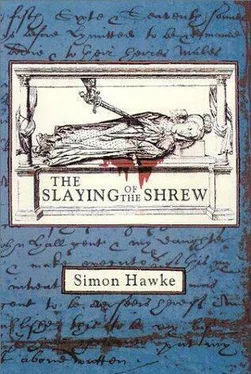Simon Hawke - The Slaying Of The Shrew
Здесь есть возможность читать онлайн «Simon Hawke - The Slaying Of The Shrew» весь текст электронной книги совершенно бесплатно (целиком полную версию без сокращений). В некоторых случаях можно слушать аудио, скачать через торрент в формате fb2 и присутствует краткое содержание. Жанр: Исторический детектив, на английском языке. Описание произведения, (предисловие) а так же отзывы посетителей доступны на портале библиотеки ЛибКат.
- Название:The Slaying Of The Shrew
- Автор:
- Жанр:
- Год:неизвестен
- ISBN:нет данных
- Рейтинг книги:5 / 5. Голосов: 1
-
Избранное:Добавить в избранное
- Отзывы:
-
Ваша оценка:
- 100
- 1
- 2
- 3
- 4
- 5
The Slaying Of The Shrew: краткое содержание, описание и аннотация
Предлагаем к чтению аннотацию, описание, краткое содержание или предисловие (зависит от того, что написал сам автор книги «The Slaying Of The Shrew»). Если вы не нашли необходимую информацию о книге — напишите в комментариях, мы постараемся отыскать её.
The Slaying Of The Shrew — читать онлайн бесплатно полную книгу (весь текст) целиком
Ниже представлен текст книги, разбитый по страницам. Система сохранения места последней прочитанной страницы, позволяет с удобством читать онлайн бесплатно книгу «The Slaying Of The Shrew», без необходимости каждый раз заново искать на чём Вы остановились. Поставьте закладку, и сможете в любой момент перейти на страницу, на которой закончили чтение.
Интервал:
Закладка:
“There’s a bright beplumaged bird,” said Smythe.
“Softly, simpleton, else he shall hear you!” whispered Kemp, glancing at him sharply.
“I doubt it,” Smythe replied, although he did lower his voice. “And methinks he would care little if he did. Look at him. He is positively green.”
Indeed, Godfrey Middleton looked decidedly ill as he stepped unsteadily out of the boat, assisted by his servants. He appeared genuinely grateful to be on dry land once again. Even though it had been only a relatively short boat trip on the Thames, Middleton acted as if he had just barely survived an arduous transatlantic crossing.
“Zounds, what beastly weather!” he exclaimed to his companions as they disembarked. “That wretched wind! ‘Twas a frightful chop out there, I tell you! I damn well nearly gave up breakfast!”
His voice was high-pitched and rather nasal and complemented his waddle perfectly. To Smythe, he sounded like a large, affronted goose, squawking with pompous indignation. The “frightful chop” that he referred to was, to Smythe’s eyes, no more than a slight display of whitecaps on the water’s surface, hardly what anyone would call rough sailing. It might be a bit of a rock in a small rowboat, perhaps, but it was only the Thames River, after all, not the English Channel. The breeze was brisk and cool, but it was a long way from being a “wretched wind.” And Smythe thought that the only reasonable excuse that anyone would have for giving up their breakfast out there would be if they were pregnant.
“Well, ‘twas a bit of an unpleasant journey, I’ll agree, but ‘tis over now and our feet are once again upon dry land,” said one of Middleton’s companions. “From now on, ‘twill all be smooth sailing.” The man chuckled at his own remark. “Eh? What? Smooth sailing? I say, that’s jolly good, what?”
This gentleman turned out to be the groom. Sir Percival Pennington-Pugh was at least the same age as the bride’s father, if not older, but there any similarity ended. Where Middleton was portly, thick-chested and short-legged, Sir Percival was thin as a hay-rake and practically all legs and elbows. And if Middleton brought to mind a puffed up goose, then Sir Percival looked like a spindly water fly, albeit one decked out in a costume so garish as to make Middleton’s clothing look positively subdued.
For the occasion of his wedding, Sir Percival had donned a white ruff and a doublet of robin’s egg blue silk with double rows of silver buttons set so close together that they touched. His sleeves were “pinked,” or slashed to show a silk shirt in a newly fashionable color named “dead Spaniard,” in honor of the sinking of the Armada. To Smythe, who did not have much of an eye for distinguishing fashionable subtleties of color, it simply looked dark purple. The groom’s fashionable if rather impractical shoes were made of light blue silk, to match his doublet, and they were likewise pinked to show off his morbid Spanish hose. His baggy gaskins were made of velvet in a violet hue and he wore so many jeweled rings that merely lifting his long-fingered, bony hands seemed to take an effort. He wore a wide-linked silver chain, enameled as was currently the fashion in shades of black and purple, to match his high-crowned hat, and in keeping with the latest court fashion of matching one’s tonsorial hues to one’s haberdashery, he had dyed his hair and pointy beard a purple shade, as well. The servants approached him and helped him don a long, purple fringed robe over his ensemble and then exchanged his hat for an elaborate, Romanesque laurel wreath made of hammered gold. Smythe thought that the unlikely combination of the pleated ruff together with the Roman robe made him look rather like an ambulatory tablecloth surmounted by the head of John the Baptist sitting on a platter.
“God blind me!” he said softly, as the groom and the father of the bride began to climb the steps toward them. “Pity poor Catherine Middleton. With such a Caesar, would for her sake these were the Ides of March and not his wedding day!”
“Shhh!” hissed Kemp, elbowing him in the ribs. “Mock this Caesar at your peril, fool,” he whispered. “They will club you down, stuff you in a weighted sack, and toss you in the river!”
Smythe fell silent, but not so much as a result of his companion’s admonition as from the sight that greeted him as the next passenger lightly stepped off the boat and pulled back the hood of her long, dark blue velvet cloak with a languid, graceful gesture.
Blanche Middleton was all of sixteen, tall for her age, raven-haired, buxom and small-waisted, with grayish-blue eyes that looked like cracked diamonds. She wore a crimson velvet gown over a cartwheel farthingale, which could not have been very comfortable for sitting in a boat, and her puff-sleeved, black velvet bodice was heavily embroidered in gold and stiffened with a pointed stomacher that accentuated a very ample bosom that was displayed even more boldly than the current fashion dictated. She looked around and her gaze settled upon Smythe with such a frank, smouldering directness that it made him look around, thinking that she must have been looking at someone else behind him on the steps, someone quite familiar to her. But when he turned, he saw that there was no one there. When he looked back, her gaze met his once again and she smiled with a sultry, mocking sort of amusement. It struck Smythe that, unquestionably, she was looking straight at him, and he looked back with a frank, appraising stare to see if she would drop her gaze. But she did not.
She came straight up the steps towards him, her eyes never leaving his, save for one moment when they flicked briefly up and down, taking his measure with a boldness that Smythe had never before encountered in a girl.
“My, my,” she said in a low and throaty voice, as she drew even with him. “You are a big one.”
Feeling flustered and not quite knowing how else to respond, Smythe bowed slightly and said, “Your servant, ma’am.”
“Indeed?” she replied, archly. “How lovely. I trust that you shall serve me well then.”
“Come on, then, Blanche, stop dawdling!” her father called to her, from further up the steps. “We must hurry up and take our places. The flotilla is approaching!”
“Coming, Father!” she called, without taking her eyes off Smythe. And then she cleared her throat slightly, took a deep breath, enhancing her already ample cleavage, lowered her eyelids, and pursed her lips before continuing on her way up the steps with a lingering backward glance over her shoulder.
It took Smythe a moment to find his voice, and when he did, all he could say was, “Good God!”
“Neither God nor goodness has anything to do with that, my dear boy,” said Kemp, dryly.
“Was I imagining things?” asked Smythe. “Kemp, did you hear? Did you see?”
“I have ears and I have eyes,” Will Kemp replied. “And I have a very great concern for the integrity and preservation of my bones, which faculty I would most heartily commend to you, my lad. Yon saucy baggage is even more trouble than that Darcie wench. If that fire she has just ignited in your loins needs cooling, then may I suggest you jump into the river now and quench the flame post haste, before it burns you and all the rest of us, besides.”
A crowd had gathered at the top of the steps behind them, drawn by the arrival of their host and their anticipation of the wedding flotilla bearing the bride. Many of the men were also doubtless drawn by the arrival of Blanche Middleton, who was certainly worth looking at and who seemed to delight in the effect she had on any male within viewing distance. Smythe noticed that all of the young aristocrats he had marked earlier were there, vying for her attention and trying to elbow one another out of the way. If this sort of thing kept up, he thought, there could well be trouble brewing before the day was through.
Читать дальшеИнтервал:
Закладка:
Похожие книги на «The Slaying Of The Shrew»
Представляем Вашему вниманию похожие книги на «The Slaying Of The Shrew» списком для выбора. Мы отобрали схожую по названию и смыслу литературу в надежде предоставить читателям больше вариантов отыскать новые, интересные, ещё непрочитанные произведения.
Обсуждение, отзывы о книге «The Slaying Of The Shrew» и просто собственные мнения читателей. Оставьте ваши комментарии, напишите, что Вы думаете о произведении, его смысле или главных героях. Укажите что конкретно понравилось, а что нет, и почему Вы так считаете.












